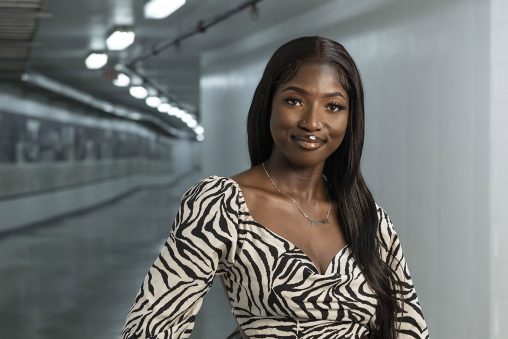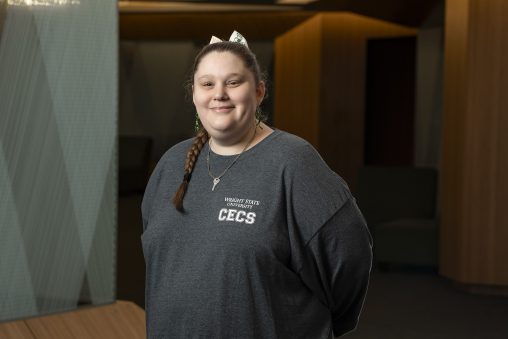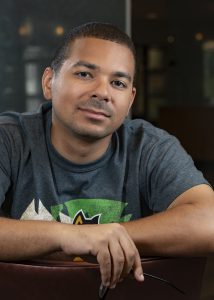 More than 900 students graduated during Wright State University’s fall commencement ceremonies in the Wright State University Nutter Center Friday, Dec. 15, and Saturday, Dec. 16.
More than 900 students graduated during Wright State University’s fall commencement ceremonies in the Wright State University Nutter Center Friday, Dec. 15, and Saturday, Dec. 16.
The 936 graduates joined more than 120,000 alumni who are making a difference throughout Raider Country, all over Ohio, across the nation and around the world.
Commencement featured a short congratulatory video from Ohio Gov. Mike DeWine, who said, “The state of Ohio and the Dayton region need Wright State graduates like you. We succeed when you succeed.”
Wright State President Sue Edwards, Ph.D., addressed the fall and summer classes of 2023, urging students, family and friends to savor the accomplishment of earning a college degree and continue their drive toward the next adventure.
“You have faced your challenges and triumphed to get to this point. However, I’m sure that you did not do it alone,” said Edwards. “You were no doubt helped, supported, and encouraged by people who care for you deeply, such as your family, friends, faculty, advisors, staff and mentors. So, please consider the people who have supported and helped you to reach this point. They are proud of you. Today take a moment to acknowledge those who have invested in you, believed in you, and given so much to you as you have been on this journey.”
View photos from the fall commencement ceremonies >>
Edwards encouraged graduates to embrace the unique circumstances that brought them to this achievement and approach future opportunities with the same positive attitude, grit and determination that they used to earn their degrees.
“Now is the time to look towards new beginnings. Just as there is no singular path that brings every graduate here today, there is also no single answer for which path you will take next,” she said. “What will you do? Your choices and hard work have just led you to complete one chapter of your story. But what chapter comes next? Each of you is writing your life story as you navigate your lives and the lives of those you impact.
“Today, set your sights on the brightest of futures. Visualize where you are going and make a plan for turning that vision into your new reality. Go out there and always be your best and show the world just what Wright State Raiders are truly made of! I am so incredibly proud of your achievements,” said Edwards.
The summer and fall classes of 2023 included graduates with 530 bachelor’s degrees, 376 master’s degrees, 36 doctoral degrees and 13 associate degrees.
The classes included 180 international students from 18 different countries. India boasted the largest number of international graduates, with 145.
The youngest graduating student was 18, earning a bachelor’s degree in mathematics. The oldest graduate was 66, earning a bachelor’s degree in organizational leadership.
Graduates by college:
- College of Engineering and Computer Science: 255
- College of Health, Education and Human Services: 204
- College of Liberal Arts: 96
- College of Science and Mathematics: 122
- Raj Soin College of Business: 183
- Lake Campus: 36
- Boonshoft School of Medicine: 61
Notable 2023 graduates

Yakai Kamara graduated with a bachelor’s degree in public health and a bachelor’s degree in organizational leadership
Yakai Kamara
Yakai Kamara graduated with a bachelor’s degree in public health, a bachelor’s degree in organizational leadership and a minor in biological sciences.
Kamara transferred to Wright State during COVID-19. The pandemic and her being in an earlier health crisis in her native country represent why she enrolled at Wright State. That, and to be among others who, like her, love other cultures and entrepreneurial spirit.
Originally from Sierra Leone in western Africa, Kamara moved with her family to Columbus when she was 14. Kamara recalls when her native country was hit with the Ebola health crisis.
“Living through Ebola was terrible,” she said. “I saw a lot of people die. No one close to me did, but we were all worried for our lives.”
After high school, Kamara enrolled at a college near Columbus but soon wanted something different.
“At that time, it didn’t have enough diversity — there was no one like me,” Kamara said. “I wanted a college close to my family in Columbus that was diverse and with a variety of majors.”
A friend who was in Wright State’s African Student Union offered to give Kamara a personal tour. She liked what she heard about Wright State, and what she saw — especially the tunnel system.
“When I transferred, I was a biology major, but I took a global public health class, and that became my true passion. I want to do research and become an epidemiologist,” Kamara said.
“Later I added organizational leadership because I wanted to learn leadership skills.”
Central to her motivation in her areas of study is the low level of public health — especially in the area of maternal health — in Sierra Leone. She wants to eventually do something to improve those conditions.
Sydney Woods
Sydney Woods is driven. Not just by her pursuit of a master’s degree in computer science but by a broader calling that will not let go of her.
“I have a constant curiosity that is only temporarily satisfied by finding the answer to the current question on my mind,” said Woods. “It drives me in everything I do; my need to learn.”
Woods likes to collect tools to help her understand many things, including mathematics.
“Computer science can be very useful when working with complex mathematical problems,” said Woods, who also graduated with a bachelor’s degree in mathematics from Wright State in 2021.
Over her time as a Wright State student, Woods has changed personally in many ways. Whether it be through obtaining a driver’s license, overcoming the loss of loved ones, navigating new friendships, or her discovering new abilities and passions within herself, she said her growth at Wright State has been meaningful.
“I’m so proud of how far I’ve come since I first stepped foot on campus,” she said.
Woods remembers fondly many people who have helped her at Wright State, including those she credits with leaving a lasting impression on her as a student and a person.
“I’ve learned that being curious is not a bad thing. It’s something to be proud of,” said Woods.
“I’m thankful that I took the class with that professor that told me this. I think I knew it when I was younger, and just forgot it as I grew up, so that reminder was really important to me.”
After graduation, Woods will start a new job at a local data analytics firm that supports defense contractors and the Department of Defense on projects relating to national security.
Carl Foster
Carl Foster’s walk across the stage at fall commencement marked the culmination of a long, difficult journey that included the foster care system, homelessness and a lack of family support.
But he persevered and looks forward to the next part of his life’s journey — helping young people who are facing the same challenges he did.
Foster received a master’s degree in educational leadership. He also earned a bachelor’s degree in sociology from Wright State in 2015.
Foster’s story starts in his native Pontiac, Michigan, where he was born to a single teenage mother. He faced many challenges growing up, including poverty and family issues. He was placed in a group home and lived in various residential facilities until he was 18. During that time, he dropped out of high school and worked for various restaurants.
When he was 20, he moved to Dayton to go into Job Corps and earned a GED diploma and a culinary arts certificate.
He received help with housing and completing paperwork for college admissions through the staff at Job Corps. He lived within walking distance of Sinclair Community College, so he enrolled there and earned an associate degree in hospitality management to align with his culinary studies.
His next step was Wright State, where he also earned a bachelor’s degree in sociology in 2015.
Today, Foster is a success coach at Dayton Public Schools. He helps students and often empathizes with their circumstances because he lived in similar situations when he was their age.
“So when I talk to the students, I have a great deal of empathy,” said Foster.
Foster understands the problems some people face because, he said, “Some study it, some lived it, and I’ve done both.”
“I’m looking into a position to put me on the pathway to becoming a high school principal,” he said. “If that means becoming a counselor or substitute teaching, whatever pathway to be a principal or work for a college with programs like Upward Bound and ISN— Independent Scholar Network — as a coordinator or director.”



 Wright State psychology team studies ways to identify fatigue in pilots, drivers
Wright State psychology team studies ways to identify fatigue in pilots, drivers  Wright State videographer Kris Sproles wins Regional Emmy and Ohio journalism award
Wright State videographer Kris Sproles wins Regional Emmy and Ohio journalism award  Wright State Boonshoft School of Medicine ranked among the nation’s best for 2024 by U.S. News
Wright State Boonshoft School of Medicine ranked among the nation’s best for 2024 by U.S. News  Exposing biotechnology
Exposing biotechnology  Wright State faculty member Dan Noel uses unique background to inspire new leaders
Wright State faculty member Dan Noel uses unique background to inspire new leaders 